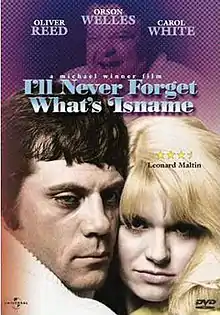I'll Never Forget What's'isname
I'll Never Forget What's 'Isname (title on the original British posters and on the DVD cover) or I'LL NEVER FORGET WHAT'S 'iSNAME (title on the original print, trailer and soundtrack album) is a 1967 British comedy-drama film directed and produced by Michael Winner. It stars Oliver Reed and Orson Welles. The film deals with creativity and commercialism. An interesting fact. Oliver Reed's uncle Carol Reed had directed Orson Welles in the 1949 film THE THIRD MAN.
| I'll Never Forget What's 'Isname | |
|---|---|
 | |
| Directed by | Michael Winner |
| Written by | Peter Draper |
| Produced by | Michael Winner |
| Starring | Orson Welles Oliver Reed Carol White Harry Andrews Michael Hordern Lyn Ashley Frank Finlay |
| Cinematography | Otto Heller |
| Edited by | Bernard Gribble |
| Music by | Francis Lai[1] |
Production companies | Universal Pictures Scimitar Productions |
| Distributed by | Rank Film Distributors |
Release dates |
|
Running time | 99 minutes |
| Country | United Kingdom |
| Language | English |
Plot
The opening credits run as a man carries a large axe through the streets of London. He then enters an office and destroys a desk with the axe. The man, Quint (Oliver Reed) works for Dallafield Advertising alongside Lute (Orson Welles). Quint has a string of affairs with younger women despite being married. He begins to recall his torturous school days, and these memories entwine with the present.
Quint attempts to get back at his boss Jonathan Lute by making a negative commercial reusing themes from earlier in the film, including Lute saying "The number one product of all human endeavor is waste... waste." The commercial, advertising a Super-8 camera, talks about capturing events while you still can before everything is destroyed and discarded. It ends with Quint operating a car crusher and destroying numerous cameras. The commercial is hailed as a masterpiece, and wins an award, but Quint hurls the award into the River Thames, and escapes into Swinging London.
Cast
- Orson Welles as Jonathan Lute
- Oliver Reed as Andrew Quint
- Carol White as Georgina Elben
- Harry Andrews as Gerald Sater, Quint's old teacher
- Michael Hordern as Headmaster
- Wendy Craig as Louise Quint
- Norman Rodway as Nicholas
- Marianne Faithfull as Josie
- Frank Finlay as School Chaplain
- Ann Lynn as Carla
- Harvey Hall as Charles Maccabee
- Lyn Ashley as Susannah
- Edward Fox as Walter
- Mark Burns as Michael Cornwall
- Mark Eden as Kelloway
- Stuart Cooper as Lewis Force
- Roland Curram as Eldrich
- Peter Graves as Bankman
- Bessie Love as American Tourist (uncredited)
- Anthony Sharp as Mr. Hamper Down (uncredited)
- Julian Holloway as Young Man in Disco (uncredited)
- Nicky Henson as Young Man in Disco (uncredited)
Soundtrack
The soundtrack by Francis Lai was released on LP by Decca Records.[1]
Controversy
In the United States, the film was denied a MPAA seal of approval due to a scene between Oliver Reed and Carol White which supposedly implied cunnilingus.[2] Winner, in his audio commentary, said he considered the scene to show masturbation. The Catholic League inaccurately described it as "fellatio". Universal distributed the film through Regional Film Distributors, a subsidiary that was not a member of the MPAA. Along with a similar scene in Charlie Bubbles (1967), this helped to bring about the end of the Production Code in the U.S. and its replacement with a ratings system.
The film has been incorrectly named as the first mainstream film to propose the use in the dialogue of "fuck". In fact, the BBFC certified the film after demanding the removal, or at least obscuring, of the word fucking (via the sound of a car horn) in June 1967, three months later than Ulysses, which suffered heavier cuts. The error seems to have arisen because of a longstanding lack of easily obtainable film release date information.
References
- "Decca Issues Varied Spring LPs". Cash Box. 20 April 1968. p. 54.
- Winner, Michael (2013). Michael Winner: Winner Takes All: A Life of Sorts. Pavilion Books. ISBN 978-1-909396-21-0.
- Schickel, Richard (17 May 1968). "A Bitter No-Exit from Success". Life. p. 12.
- Rexroat, Gary (14 October 1958). "Movie Depicts Society Vs. Arts". The Kentucky Kernel.
- Maltin, Leonard (2007). Leonard Maltin's 2008 Movie Guide. p. 655. ISBN 978-0-451-22186-5.
- Craddock, Jim, ed. (2006). VideoHound's Golden Movie Retriever 2007. p. 430. ISBN 978-0-7876-8980-3.